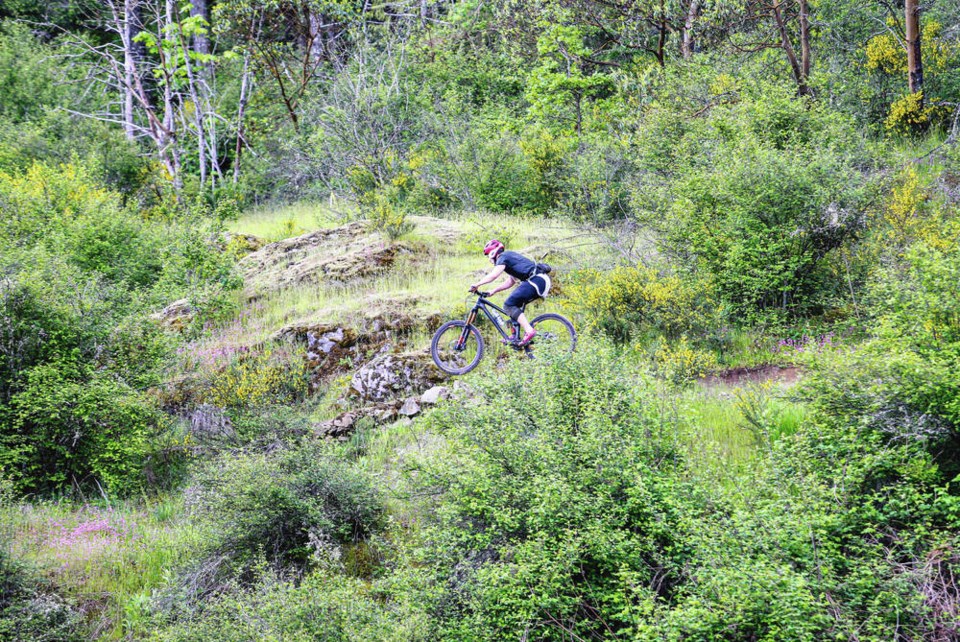New guidelines that would add some mountain-biking trails and enhance others in regional parks have been approved by the Capital Regional District board.
Passions clashed on Wednesday as mountain bikers called for more trails to handle the growing numbers of riders in the region while other park users concerned for the environment said the sport causes ecological damage in places intended for preservation.
After dozens of speakers and an hour of debate, CRD directors recognized the changing user base in regional parks and approved the new guidelines as a balance, with some suggesting that future parkland acquisitions should be considered with mountain biking in mind.
The new guidelines were developed by the CRD’s parks committee after extensive consultations with mountain bikers and concerned park users.
“This sets out terms of reference on how to integrate mountain biking in existing park systems as [the sport] expands in the region,” said parks committee chair Rebecca Mersereau. “Our parks are acquired and managed for the primary purpose of ecological protection. We can’t just flip a switch.”
She said the guidelines are a measured way to locate popular activities such as mountain biking in a responsible way.
Directors approved “short-term actions” to the new guidelines that include continued improvements to the trails within the mountain bike area of Mount Work Regional Park and upgrades to the technical training area, an overall mountain biking area plan and working with South Island Mountain Bike Society on trail upgrades and improved signage.
The CRD will review mountain biking trail opportunities in Thetis Lake Regional Park that fit within the existing management plan. It will also explore an additional licence agreement to expand trails at Mount Manuel Quimper within Sea to Sea Regional Park.
Other immediate actions will include improving relationships between the CRD, the mountain-biking community, and various stakeholders; developing a communication campaign for this summer on the new guidelines and improved trail etiquette; and creation of a new mountain-biking steward volunteer position.
CRD staff will be trained as certified trail builders to improve capacity and to provide mountain-biking trails within the existing trail network.
Mountain bikers stressed that people would continue to build illegal or “rogue” trails in the parks unless the CRD provided more sanctioned tracks.
Director Ben Isitt called the mountain-biking issue in regional parks “challenging,” because the primary purpose of parks is ecological preservation. However, he said, parks also provide “medicine” for the mental and physical health of its many users and their different activities.
Isitt supported the new guidelines based on a “carrot and stick approach” — high standards of trail design that take the environment into account, along with strict enforcement and heavy fines for those who go off approved trails and build unauthorized routes.
Director and Victoria Mayor Lisa Helps called it a “canary in a coal mine issue.”
“Our population continues to grow and the population continues to love parks,” she said. “The mountain-biking people have shown a desire to help, to be stewards of these areas. We have people who love the biodiversity of parks. There are two different groups of people with different uses, but they are similar.”
Conservationists, many of whom fought to protect the district’s wilderness areas, said they are angry about the environmental damage caused by bikers and urged the CRD to stop mountain biking in sensitive ecosystems. Some of Wednesday’s speakers called for more enforcement and others for a ban on biking in certain areas.
Alastair Craighead, a Victoria resident, said mountain biking already seems to be accepted in all CRD parks and he was concerned about the disruption of sensitive habitats and key wildlife corridors.
“Nature can’t compromise, humans can,” he said.
Highlands resident Sarah Gose said she has patched up de-mossed rocks and eroded areas on unauthorized trails at Mount Work Park. She wants the mountain-biking community to “take responsibility against trail builders,” who, she said, are the biggest threat to regional parks.
Alison Spriggs, a former parks campaigner with the Wilderness Committee and The Land Conservancy, said there shouldn’t be a compromise.
“We cannot shoehorn everything into our parks,” said Spriggs. “We need more solutions outside of our parks.” The CRD should look at acquiring new land for recreational purposes such as mountain biking, said Spriggs.
Several directors said future acquisitions of parkland should be considered with heavier recreational use in mind.
Mountain bikers said the guidelines will help to accommodate a sport that has grown since the 1990s and spiked during the pandemic as people thirst for outdoor adventure.
Seamus McGrath, a two-time Olympic competitor, said riders ranged from as young as four to people well into their 70s.
He cited the huge economic spinoffs in communities like Cumberland, Whistler and North Vancouver, which have expanded their trail systems.
Patrick Nolan, who coaches mountain biking at Hartland, said he has 300 students this year and expects about 600 by year end.
“We need co-operation with local government to help guide trail management so these user groups can grow organically,” he said.
Alon Soraya, of the South Island Mountain Bike Society, said planning and implementing well-built, sustainable trails in the right areas is the best way forward.
dkloster@timescolonist.com



